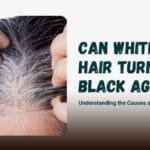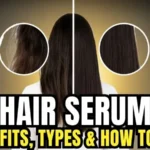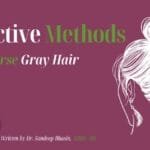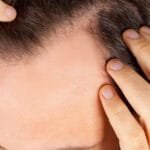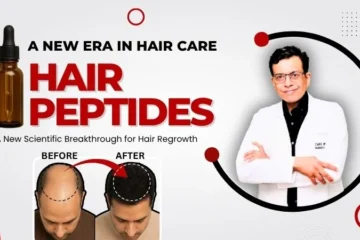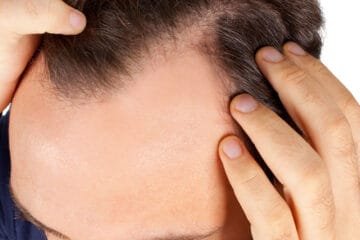Introduction
Hi, I am Dr. Sandeep Bhasin. One of the most common myths about coloring your hair is that hair dye turns hair grey. As you will see in this blog, this is not true. Another popular myth often thrown around is the notion that all hair colors employ hydrogen peroxide. Although many hair color brands may use it, Indus Valley’s gel color is a no hydrogen peroxide hair color for a reason. There are three main ways of transitioning to gray hair from dyed hair: the cold turkey method (letting the dye grow out or cutting it out), the salon transition (having a stylist blend your dyed hair to match your natural gray), or the dye-strip technique (a combination of various methods).
Ever heard the saying that applying hair dye will make your hair turn gray? It’s a common myth that causes many to hesitate before coloring their locks. But how much truth is there to this belief? In this article, we’ll dive deep into the topic and explore whether hair dye really causes grey hair. All of these methods have their advantages and disadvantages. Some are free, and some are expensive. Some are faster than others. Which method you choose depends on your temperament, your preferred hair length, and your budget.
The human body has millions of hair follicles, or small sacs, lining the skin. These follicles generate hair and pigment cells that contain melanin. Over time, hair follicles lose pigment cells, resulting in white hair color.
In this article, I’ll look at some common causes of prematurely white hair, along with ways to slow down or prevent the graying process.
Understanding Hair Structure
Anatomy of Hair
To understand whether hair dye can turn hair grey, we first need to understand the structure of hair. Each strand of hair is made up of three layers: the cuticle, cortex, and medulla. The cuticle is the outermost layer, protecting the inner layers. The cortex contains melanin, which gives hair its color, and the medulla is the innermost layer, often hollow and not always present.
What Gives Hair Its Color?
Hair color comes from melanin, the same pigment responsible for skin color. There are two types of melanin in hair: eumelanin (brown to black pigments) and pheomelanin (yellow to red pigments). The combination and amount of these melanins determine your natural hair color.
When transitioning to gray hair from dyed hair, there are three main methods to consider:
- The Cold Turkey Method: Letting the dye grow out or cutting it out.
- The Salon Transition: Having a stylist blend your dyed hair to match your natural gray.
- The Dye-Strip Technique: A combination of various methods.
Each method has its advantages and disadvantages. Some are free, while others can be expensive. Some are faster than others. The best choice depends on your temperament, your preferred hair length, and your budget.
Understanding Why Hair Turns Gray
The human body has millions of hair follicles, which generate hair and color or pigment cells that contain melanin. Over time, hair follicles lose pigment cells, resulting in white hair color. But what causes hair to turn white prematurely? Let’s explore.
Causes of White Hair
- Vitamin Deficiencies: Deficiencies in vitamins B9, B12, biotin, or vitamin D can lead to premature graying. Studies have shown that nutritional deficiencies affect pigmentation, and color can sometimes return with vitamin supplementation.
- Genetics: Genetics play a significant role in premature graying. Family history and race also influence when and how quickly hair turns gray.
- Oxidative Stress: This imbalance between free radicals and antioxidants in the body can accelerate aging, including premature graying.
- Medical Conditions: Conditions like thyroid dysfunction and alopecia areata can increase the risk of early graying.
- Real-Life Stressors: While stress might play a role, it’s often part of a bigger picture involving disease and other factors.
- Smoking: Smokers are more likely to experience premature graying.
- Chemical Hair Dyes and Products: Many contain harmful ingredients like hydrogen peroxide, which can decrease melanin and lead to white hair.
How Hair Dye Works
Types of Hair Dye
There are various types of hair dye, including temporary, semi-permanent, and permanent dyes. Each type works differently, affecting how long the color lasts and how it interacts with your hair.
Chemical Process of Hair Dyeing
Permanent hair dyes contain chemicals like ammonia and peroxide that penetrate the hair shaft to deposit color. These chemicals open up the cuticle layer and allow the dye to reach the cortex, where it reacts with the natural pigments.
Common Myths About Hair Dye
- Myth: Hair Dye Causes Grey Hair: One of the most persistent myths is that hair dye can cause grey hair. However, there’s no scientific evidence to support this claim. Grey hair is primarily due to genetics and aging, not hair dye.
- Myth: Hair Dye Damages Hair Permanently: While hair dye can cause some damage, it doesn’t permanently harm your hair if used correctly and with proper care.
Scientific Evidence
- Studies on Hair Dye and Grey Hair
Research indicates that there is no direct link between hair dye and the onset of grey hair. Studies show that genetics and natural aging are the main factors.
- Expert Opinions
Dermatologists and hair care experts agree that hair dye does not cause grey hair. They emphasize the importance of proper hair care to maintain healthy, dyed hair.
Hair Care Tips for Dyed Hair
Maintaining Hair Health Post-Dye
- Use sulfate-free shampoos and conditioners to avoid stripping color.
- Deep condition regularly to keep hair hydrated.
- Avoid excessive heat styling to prevent damage.
Recommended Hair Products
Look for products specifically designed for color-treated hair. These products help maintain the vibrancy and health of your dyed hair.
The Role of Hydrogen Peroxide in Hair Coloring
Hydrogen peroxide is a key ingredient in many hair coloring products due to its bleaching properties. It helps remove natural pigment, allowing new color to bond to the hair shaft. However, it can damage hair if used incorrectly or too frequently, leading to brittleness and dryness. Continuous use can change the texture and sheen of your hair, making it look dull over time. For long-term hair health, switching to natural hair color is a wise choice.
Why Some Brands Avoid Hydrogen Peroxide
Aware of the potential damage hydrogen peroxide can cause, some companies, like Indus Valley, have developed alternative formulas. These are gentler on the hair, minimizing chemical exposure while providing effective coloring.
Does Hair Coloring Increase Gray Hair?
It’s a common belief that coloring hair leads to more gray hairs. In reality, gray hair is determined by genetics and the aging of hair follicles. Hair coloring does not accelerate this process. What often happens is that as gray roots reappear after coloring, the contrast makes it seem like graying is accelerating, but this is just the natural hair growth cycle.
Indus Valley Gel Color: A Safer Alternative
Indus Valley’s organically natural gel color offers numerous benefits over chemically based equivalents. It doesn’t contain hydrogen peroxide, which helps prevent permanent gray hairs. The gel color nourishes and cares for your hair, thanks to its enhancement with certified organic herbs. It is considered one of the best hair colors for women in terms of beauty and safety.
Benefits of Hydrogen Peroxide-Free Hair Color
- Reduced Hair Damage: Less breakage and better moisture retention.
- Long-Lasting Color: Deep, intense coverage.
- Sensitive Scalp Friendly: Minimizes irritation and discomfort.
Prevention and Reversing Premature White Hair
While genetics and aging cannot be reversed, addressing vitamin deficiencies and oxidative stress can slow down or prevent further graying.
Tips for Preventing White Hair
- Eat More Antioxidants: Fresh fruits, vegetables, green tea, olive oil, and fish can reduce oxidative stress.
- Address Deficiencies: Consume foods rich in vitamins B12, D, and other essential nutrients.
- Quit Smoking: Smoking accelerates graying and overall aging.
- Natural Remedies: Use curry leaves, bhringaraj, Indian gooseberry, black tea, copper-rich foods, and ridge gourd oil to slow down hair whitening.
Natural Remedies for Maintaining Hair Color
For those looking to slow down or prevent premature graying, several natural remedies can be effective:
Curry Leaves
The medicinal use of curry leaves dates back centuries. When combined with hair oil and applied to the scalp, curry leaves can slow premature graying. These leaves can be found in Indian supermarkets and many traditional grocery stores.
Bhringaraj
Also known as the false daisy, bhringaraj is reputed to darken hair and prevent early graying. The juice of bhringaraj leaves, boiled in coconut or sesame oil, can be massaged into the hair for best results. It’s also available in oil form.
Indian Gooseberry (Amla)
Amla is known for its rich antioxidant properties and ability to promote pigmentation. It can reverse premature graying by boosting melanin production. Amla can be found as a fruit in Indian grocery stores or as a powder or supplement online or in health food stores. The powder can be mixed with coconut oil and applied directly to the scalp.
Black Tea
Black tea can darken, shine, and soften hair. Steep three to five tea bags in two cups of boiling water, let it cool, and then apply to clean, wet hair. You can also mix black tea with conditioner, leave it in your hair for an hour, and then rinse it out.
Copper
Low copper levels can lead to premature graying. Incorporate copper-rich foods like beef liver, lentils, almonds, dark chocolate, and asparagus into your diet.
Ridge Gourd
Ridge gourd is known for restoring hair pigment and stimulating hair roots. Regular massages with ridge gourd oil can prevent hair from turning white. This oil is available for purchase online.
Discover natural remedies to reverse gray hair and restore your youthful look at Carewell Medical Centre.
The Benefits of Choosing Indus Valley Gel Color
Why Choose Indus Valley Gel Color?
The damage-free formulation of Indus Valley Gel Color stands out in the hair color industry. This product provides superb coloring without ammonia, hydrogen peroxide, or PPD. Combining eight potent natural herbs with certified organic ingredients, it not only adds color but also repairs damaged hair caused by chemical-based colors. With just one application, it effectively covers gray areas, and the color lasts for four to six weeks. Depending on the length of your hair, a single pack can be used for several applications. Its gel foundation ensures a clean, tidy, and non-drippy coloring experience.
Embracing Your Natural Hair
While many people turn to hair dye to cover their gray hairs, it’s also important to embrace and care for your natural hair color, whatever stage it’s in. Transitioning to gray hair can be a graceful and empowering choice, and understanding how to care for it can make a significant difference.
Caring for Gray Hair
Gray hair tends to be drier and more fragile than pigmented hair, so it requires extra care and attention. Here are some tips to keep your gray hair looking its best:
- Moisturize Regularly: Use deep conditioning treatments and hair masks to keep your hair hydrated. Look for products with natural oils like argan, coconut, or jojoba oil.
- Protect from Heat: Minimize the use of heat styling tools. When you do use them, always apply a heat protectant spray to shield your hair from damage.
- Gentle Cleansing: Use sulfate-free shampoos and conditioners that are gentle on your hair and scalp. Harsh chemicals can strip natural oils and further dry out your hair.
- Neutralize Yellow Tones: Gray hair can sometimes develop yellowish tones due to environmental factors. Use a purple shampoo or conditioner to neutralize these tones and keep your gray hair bright and vibrant.
Natural Enhancements
If you prefer not to use chemical dyes but still want to enhance your natural hair color, consider these natural alternatives:
- Henna: A natural dye made from the henna plant that can add rich, reddish tones to your hair. It also conditions and strengthens the hair shaft.
- Indigo: Often used with henna, indigo can create darker shades, ranging from brown to black.
- Chamomile Tea: For those with light hair, chamomile tea rinses can bring out natural highlights and add a golden sheen.
- Coffee: Rinsing hair with brewed coffee can enhance dark hair and add subtle, rich tones.
The Psychological Benefits of Embracing Gray Hair
Embracing your natural gray hair can be a liberating experience. It allows you to break free from societal expectations and embrace your true self. Many find that going gray enhances their confidence and self-acceptance. Here are some psychological benefits of embracing your gray hair:
- Authenticity: Embracing your natural hair color can help you feel more authentic and true to yourself.
- Self-Confidence: Accepting your natural beauty can boost your self-esteem and confidence.
- Stress Reduction: No longer worrying about dyeing your hair can reduce stress and anxiety related to appearance.
- Inspiration for Others: By embracing your gray hair, you can inspire others to do the same and feel confident in their natural beauty.
Conclusion
In conclusion, applying hair dye does not turn your hair grey. The graying process is primarily influenced by genetics and natural aging. While hair dye can cause some damage, it does not affect the pigmentation process. Maintaining a healthy lifestyle and using proper hair care products can help you enjoy vibrant, colored hair without fear.
FAQs About Hair Dye and Grey Hair
No, hair dye does not cause gray hair. Genetics and aging are the primary factors.
Yes, with proper care and quality products, regular dyeing is safe.
Natural dyes are less harsh but still require proper hair care.
Yes, stress can accelerate the greying process, but it’s not the sole cause.
Look for sulfate-free shampoos and conditioners designed for color-treated hair.
Not necessarily. Grey hair is usually a natural part of aging.
Use products designed for color-treated hair and deep condition regularly.




